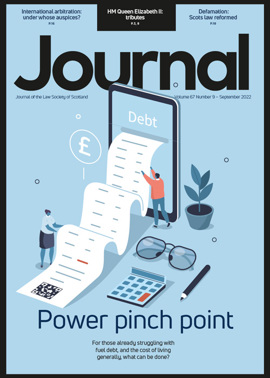Families across frontiers

The post-Brexit, post-pandemic era heralds new challenges for family law specialists.
Borders have opened up again, but free movement of people between EU member states is no longer a concept on which we can rely. Clients are beginning to look further afield than our European neighbours for solutions to the challenges they and their families face, too.
We have been struck by the spike in instructions involving an international element in recent weeks. More and more often we find ourselves collaborating to find practical legal solutions.
This article will explore the immigration dimension of family and child law scenarios, highlighting the benefit of seeking guidance from an immigration specialist in family law scenarios involving international families.
We begin by considering two real life scenarios which coincidentally both involve family creation rather than separation. The first example draws on the facts of a reported case; the second on the bare bones of an ongoing case with the details changed to protect client anonymity.
X, Y and Z
The case of Re X, Y and Z (Children: Parental Orders: Time Limit) [2022] EWHC 198 (Fam) contains elements of immigration law, EU law, fertility law and the law of jurisdiction, though it is essentially a child law case about the time limit for lodging an application for a parental order following a surrogacy arrangement.
A married same sex couple, TT and RR, decided to start a family using TT’s sperm and donor eggs. The couple lived in Denmark. TT was a British citizen; RR a Danish citizen. The respondents, Mr and Mrs HH and Mr and Mrs JJ, were US citizens. Mrs HH and Mrs JJ acted as surrogates. TT and RR had deliberately opted to work with a surrogate in the US due to the perceived certainty around parentage in terms of surrogacy law there.
When twins X and Y were born, the couple obtained a declaratory judgment from the court in Oregon to the effect that they were considered their legal parents, enabling them to return to Denmark with the children to live as a family there. X and Y had Danish passports and Danish citizenship as well as US citizenship.
TT was present when Z was born in California some two years later. RR and the twins joined the new arrival in California before returning to Denmark as a family when Z had been issued with her US passport. TT and RR were recognised as her legal parents under a pre-birth order obtained in terms of the law of California.
In 2019 the couple tried to register their daughter as a Danish citizen, to be told by the authorities that they were not recognised as her legal parents under Danish law. Z could not obtain Danish citizenship because of that absence of the status of legal parents; further, the authorities rescinded X and Y’s Danish citizenship.
The children were threatened with deportation. TT had British citizenship, and on the basis of that the three children were able to be registered as British citizens with acquired permanent residence in Denmark on 16 December 2020, a mere two weeks before the UK left the EU. The births were re-registered in Denmark. TT was registered as the “father” and the surrogates registered as each of the children’s “mothers”.
Luckily the family had relocated to the UK in 2021, therefore TT had resumed his domicile of origin thus establishing a basis for jurisdiction for the application for parental orders in respect of each of the children, albeit outside the statutory time limit.
Thankfully this tale has a happy ending. The court drew upon various legal principles to reach the right decision to secure the welfare of the children.
Satisfaction of immigration requirements is essential to the establishment of legal parentage.
The adoption of P
A young Scottish man (AB), having travelled to Cambodia to do voluntary work, chances upon a young child who has recently lost his mother. He secures legal guardianship of the boy in Cambodia. This makes him legally liable to support the child financially. The relationship goes further than that. The child sees our protagonist as his father in every sense.
Following his return to Scotland, AB establishes a successful business operating between Scotland, Cambodia and the UAE. His family is truly international, with the child spending time between each of the countries in which his father lives and works. In order to be able to move freely with his son and to secure schooling, AB decides to pursue adoption. He wishes to be recognised as the child’s legal parent, primarily to consolidate a relationship already enjoyed in practical terms but also to facilitate the child’s education and residence with his father. Without having legal parentage the child cannot travel freely between the countries in which he would live, learn and holiday.
Pursuit of the adoption required consideration of the law around jurisdiction and legal status, partly to be able to comply with immigration requirements of numerous countries which in turn would enable AB to fulfil his parental responsibilities and those financial obligations created by the earlier award of guardianship.
Parentage becomes in part a vehicle for satisfaction of immigration requirements.
These scenarios are essentially about surrogacy and adoption, but both highlight beautifully the complex issues which can arise for international families.
British citizenship
British citizens and certain Commonwealth citizens have the right of abode in the UK. This means that they are allowed to live or work in the UK without any immigration restrictions. In other words, they will not need a visa to come to the UK and there is no time limit on how long they can spend in the UK. Those individuals who do not have the right of abode are subject to immigration control (unless otherwise exempt), and will generally require permission to enter the UK.
What are the key concepts?
British citizenship
Birth in the UK does not make a child automatically British; citizenship depends on the nationality and/or immigration status of the parents at the time of birth.
For those based overseas and considering starting a family, one consideration may be where any child is born. It is an important consideration, as the decision can have an impact on the child’s, and potentially any future grandchild’s, rights and entitlements to British citizenship.
British citizenship is normally passed down one generation to children born outside the UK, provided the British parents are not themselves citizens by descent. This would mean a child might automatically become a citizen if born outside the UK to a British parent, but could not automatically pass on their citizenship to their children born overseas. That said, in certain circumstances the child may be eligible to apply to register as British depending on their personal circumstances.
Immigration control
For those individuals who are not British citizens and do not have the right of abode in the UK, they will usually have to consider the visa routes available to them when relocating to the UK. The visa options will largely depend on an individual’s personal circumstances, for example whether they are coming to the UK to join family or for work.
When relocating it is necessary to consider the position of all family members hoping to relocate as part of the family unit, including any children. Where both parents have already relocated, or are relocating to the United Kingdom (or where one parent is relocating and the other is deceased), the immigration rules generally permit them to bring their children provided the visa requirements are met. These usually include the child or children being under the age of 18 at the date of the visa application and that they will be adequately maintained and accommodated on arrival.
However, where one of the parents is going to be based in the UK and there is a surviving parent who will remain abroad, the position is more complicated. This will often require the incoming parent showing that they have sole responsibility for the child’s upbringing or that there are serious and compelling circumstances which would make the child’s exclusion from the UK undesirable and that suitable arrangements have been made for their care. Such cases will be fact specific and depend on the circumstances and evidence that can be put forward in support of an application.
Conclusion
One article cannot do justice to the myriad and complex considerations to be taken into account in assisting international clients. Both the scenarios discussed above highlight the wonderfully creative options which are potentially available to clients wishing to establish themselves as legal parents. Both scenarios also highlight the difficulties which can arise in terms of movement of parents and children.
We must look to immigration law in order to identify potential barriers, but also to find potential solutions. As the world becomes smaller and more accessible, it is increasingly important for family law specialists to open their minds to other practice areas, seeking specialist input from colleagues practising in other disciplines where appropriate.
Regulars
Perspectives
Features
Briefings
- Civil court: Pointers to the future
- Intellectual property: Data mining for all
- Agriculture: The next land reform package
- Corporate: Developments and divergence in data
- Sport: Lessons from the Whyte review
- Scottish Solicitors' Discipline Tribunal
- Property: Registration – over a decade?
- In-house: The top team – three more years







